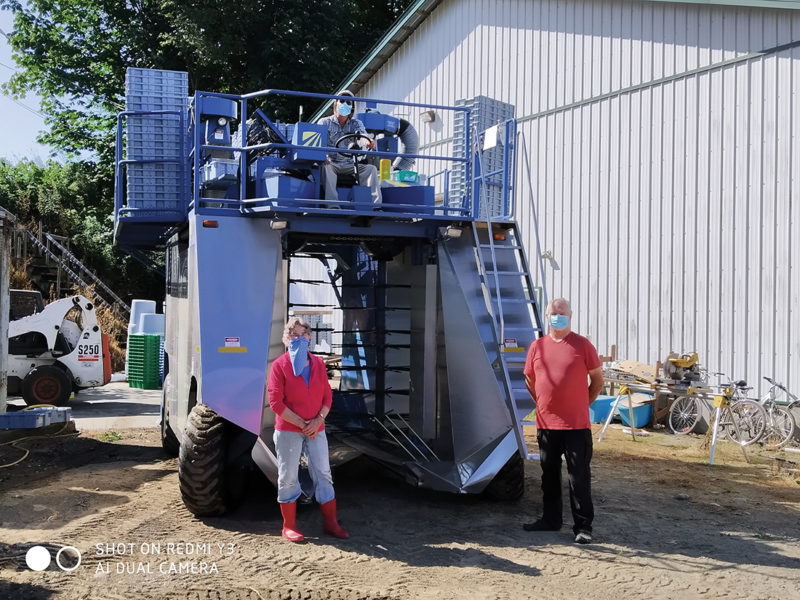ABBOTSFORD – Blueberry growers have turned to mechanical harvesting in unprecedented numbers this year due to a shortage of labour and impacts of COVID-19.
While growers usually employ thousands of hand harvesters, this year saw hundreds of machines harvesting berries across the Fraser Valley.
Although farmers have been using machines for several years, many did so out of necessity this year rather than choice.
Sarbjit Kaur Gill from Prairie Fruit Farm in Chilliwack says he was forced to lease a berry harvester this season.
“We have Duke and Bluecrop varieties at our farm. Usually, we prefer first picking with hands while the second picking is performed with the machines. However, due to shortage of labour, we used a machine for the first picking as well,” he says. “I feel this was a very bad year for the farmers. Firstly, we couldn’t procure the machine and secondly, the wet condition of the field made operating it a challenge, causing us great financial loss.”
Rajinder Singh Lally, owner of Lally Farms in Abbotsford, believes mechanical harvesting is the future of berry picking.
“The delay in picking results in over-ripening of berries, which leads to a decline in price of the fruit. As there was a shortage of labour, we used three machines per farm to pick the fruit. From this experience, I feel that machines are a more cost-effective alternative and we are planning to purchase more machines in the coming years,” says Lally.
But the results don’t please everyone.
“I have been engaged in agriculture for 40 years. Last year, we used machines on less than 10% of our acreage but this year approximately 40% of our acreage was picked by machines. We deal in the fresh market but this year, I had to go for processing due to mechanized harvesting,” says one disappointed Abbotsford farmer, who did not want to be named.
Cost savings
Mechanized picking and hand picking each have their advantages, the chief one being cost.
While hand picking costs around 50 to 60 cents per pound, mechanical harvesting costs just 15 to 20 cents a pound. Hand picking is much slower in comparison to mechanized picking. On average, one picker can pick up to 400 pounds of berries whereas a machine can pick up to three acres in a day, or upwards of 60,000 pounds of berries.
Despite the apparent advantages, mechanized picking does have a downside. Machine-harvested berries are mostly used for processing and the prices for processed berries are much less compared to the fresh market.
“In the fresh market, blueberries can be sold at $1 to $2 per pound during the season. On the other hand, the processed berries can fetch up to 60 to 65 cents per pound only. While it saves the picking cost, there is a decline in the profits made from the mechanically harvested berry,” says Kerry Seale, from Blueberry Junction in Abbotsford. “We felt the labour pains during the previous years. So, we decided to grow some varieties that can be easily picked with machines.”
The labour issues associated with COVID-19 have more growers considering such moves this year.
“Due to CERB and COVID, there was a huge shortage of labour. Many farmers opted for mechanized picking this year,” says Anju Gill, executive director of the BC Blueberry Council. “In case of mechanized harvesting, prior arrangements like pruning are required well ahead of the harvesting. Due to lack of these arrangements, it led to ineffective picking by machines also. However, at the same time, there are some growers that grow berries for processing only and they always pick using the machines.”
Parm Bains, president of Westberry Farms in Abbotsford, says machines have been popular among farmers for several years as farmers looked to cut costs as production has grown and labour costs have risen.
“There has been a significant rise in the production and acres of blueberries in British Columbia during the last few decades. In the 80s, we had 20 million pounds of berries and last year we had over 200 million pounds,” says Bains. “Around 17,000 to 18,000 workers are needed but only around 6,000 pickers are available. More and more machines are coming to the market every year as farmers are trying to save money on picking side.”
The shortage of pickers was front-and-centre this year due to COVID-19, among other factors.
“Farmers struggled to pick berries,” says Bains. “Fields were wet. Besides labour, machines were also not available in time.”
While more berries went to processing, Bains says it’s difficult to gauge the impact on grower revenues.
“At this moment we are hoping for better prices in comparison to last year,” he says.


 BC Tree Fruits prepares to sell assets, apples
BC Tree Fruits prepares to sell assets, apples